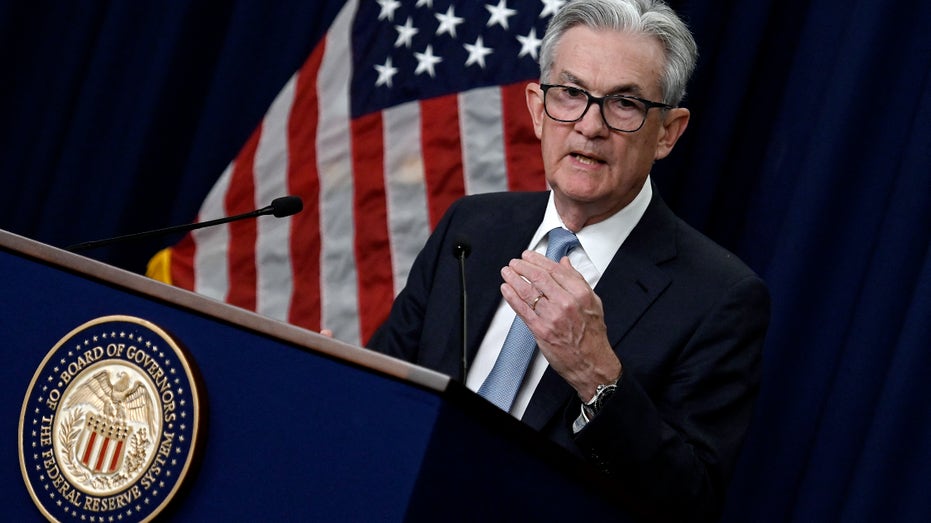Fed raises interest rates by 75 basis points in another historic move to tackle inflation
Inflation soared to a fresh 40-year high in June, further raising pressure on Fed officials
Fed raises rates by 75 basis points as expected
Recent indicators show spending and production have 'softened,' says the Fed. FOX Business White House correspondent Edward Lawrence with more.
The Federal Reserve on Wednesday raised its benchmark interest rate by 75 basis points for the second straight month as it tries to bring scorching-hot inflation under control, a move that threatens to slow U.S. economic growth and exacerbate financial pressure on Americans.
The three-quarter percentage point hikes in June and July — the first since 1994 — underscore just how serious Fed officials are about tackling the inflation crisis after a string of alarming economic reports. Policymakers voted unanimously to approve the latest super-sized hike.
The move puts the key benchmark federal funds rate at a range of 2.25% to 2.50%, the highest since the pandemic began two years ago. It marks the fourth consecutive rate increase this year.
Policymakers signaled in their post-meeting statement that additional increases are likely in the coming months as they remain "strongly committed to returning inflation to its 2% objective." Chairman Jerome Powell said during his post-meeting press conference that another 75-basis point hike could be appropriate in the future but that it ultimately hinges on upcoming economic data.
FEDERAL RESERVE HIKES RATES, POWELL’S PRESS CONFERENCE: LIVE UPDATES
Inflation accelerated more than expected in June, with the Labor Department reporting earlier this month that the consumer price index surged 9.1% last month, the fastest pace since 1981.
But the efforts to combat inflation carry a potential risk of recession, with a growing number of economists and Wall Street firms forecasting an economic downturn this year or next. Hiking interest rates tends to create higher rates on consumer and business loans, which slows the economy by forcing employers to cut back on spending. Mortgage rates have nearly doubled from one year ago to 5.54%, while some credit card issuers have ratcheted up their rates to 20%.
There are conflicting signs about the economy's health: the number of Americans filing for unemployment benefits has gradually increased, companies have announced layoffs or hiring freezes, and the housing market is softening. At the same time, unemployment remains near a historic low, and consumers are still spending heavily despite hot inflation.
Fed officials acknowledged signs of softening activity in the economy since they met last month, including a slowdown in spending and production, but they pointed to "robust" job gains and a near historic-low unemployment rate. Powell reiterated on Wednesday that officials believe there is a "path" to a soft landing, though he acknowledged it has narrowed — and could narrow further.
"We think it’s necessary to have growth slow down," Powell said. "We actually think we need a period of growth below potential in order to create some slack so that the supply side can catch up."
Economists widely agree the risks of a recession climbed considerably this year and that avoiding a downturn in the near future will be increasingly difficult as the Fed tightens monetary policy.
The Fed meeting comes just one day before the Commerce Department releases the highly anticipated second-quarter gross domestic product reading, which is expected to show that the economy grew 0.5% in the period from April to June.

Federal Reserve Chair Jerome Powell speaks during a news conference on interest rates, the economy and monetary policy actions at the Federal Reserve Building in Washington, D.C., June 15, 2022. (Olivier Douliery/AFP via Getty Images / Getty Images)
Economic output already fell over the first three months of the year, with GDP — the broadest measure of goods and services produced in the U.S. — tumbling 1.6%, the worst performance since the spring of 2020, when the economy was still deep in the throes of the COVID-induced recession.
Recessions are technically defined by two consecutive quarters of negative economic growth and are characterized by high unemployment, low or negative GDP growth, falling income and slowing retail sales, according to the National Bureau of Economic Research (NBER), which tracks downturns.
If the economy declines in the second quarter, it could meet the technical criteria for a recession, which requires a "significant decline in economic activity that is spread across the economy and that lasts more than a few months." Still, the NBER — the semi-official arbiter — may not confirm it immediately as it typically waits up to a year to call it.
But Powell, in an unusually blunt answer, told reporters that he does not believe the U.S. economy is currently in a recession.
CLICK HERE TO READ MORE ON FOX BUSINESS
"It doesn't make sense that the economy would be in a recession," he said, referencing the 3.6% unemployment rate and the 2.7 million people hired in the first half of the year. "So, I don't think the U.S. economy is in a recession right now."





















